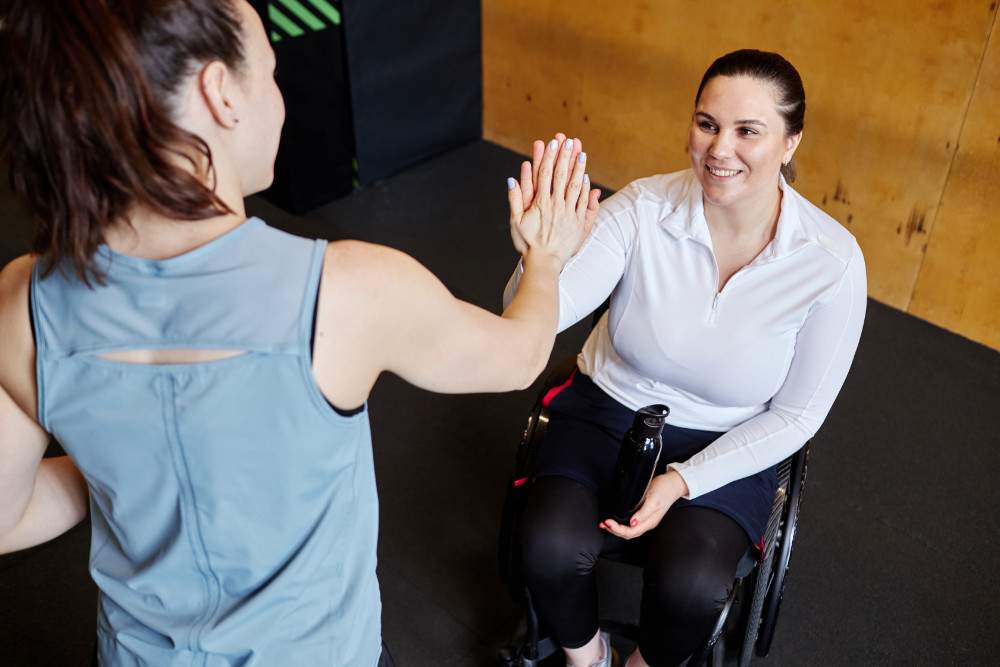If you’re living with a disability in Australia and want to get fit, you might be wondering whether the NDIS will pay for a personal trainer. The short answer is yes, but only under specific conditions.
Can NDIS Pay For Personal Training?
Yes, NDIS can cover personal trainer costs, but the training must directly relate to your disability goals and help you build capacity or independence. The NDIS won’t fund general fitness or gym memberships that any Australian could access. Your personal trainer needs to help you achieve specific goals outlined in your NDIS plan.
According to NDIS guidelines, funding falls under the Improved Health and Wellbeing category. This means your personal training sessions must address functional capacity building related to your disability. For example, if you have mobility issues and need strength training to walk better, or if you’re recovering from an injury and need guided exercise, NDIS may approve funding.
What Makes A Trainer NDIS Eligible?
Not every personal trainer can work with NDIS participants. Your trainer needs to meet certain requirements:
Trainer Requirements
- Hold current fitness qualifications (minimum Certificate III and IV in Fitness)
- Have professional indemnity insurance
- Understand disability support and how to adapt exercises
- Be registered as an NDIS provider (preferred but not always required)
- Create programs that link directly to your NDIS goals
The key difference between a regular gym membership and NDIS-funded personal training is the therapeutic and goal-focused approach. Your trainer must document how each session helps you progress toward your plan goals.
How Much Does NDIS Pay?
NDIS rates for personal training typically range from $60 to $193.99 per hour, depending on the level of support you need and when the service is provided. Standard weekday rates sit around $60-$68 per hour, while evening and weekend rates increase to approximately $81-$193.99 per hour.
These rates come from the NDIS Price Guide, which sets maximum amounts providers can charge. Your actual costs depend on your support needs and the trainer’s qualifications. Some trainers charge less than the maximum rate, so it’s worth shopping around.
9 Steps To Shed 5-10kg In 6 Weeks
Includes an exercise plan, nutrition plan, and 20+ tips and tricks.
Download FreeWhich NDIS Category Covers It?
Personal training falls under Core Supports, specifically the Improved Health and Wellbeing budget category. This is the most flexible part of your NDIS plan. You can use these funds for various supports that help you live independently and participate in your community.
Your plan manager or support coordinator can help you understand how much funding you have available in this category. If you’re self-managed, you have more flexibility in choosing providers who aren’t registered with NDIS.
What Goals Qualify For Funding?
NDIS approves personal training when it helps you achieve reasonable and necessary goals. Here are examples of goals that typically get approved:
Qualifying Goals
- Building strength to improve mobility and reduce fall risk
- Increasing fitness to manage chronic health conditions related to your disability
- Developing exercise routines you can maintain independently
- Improving coordination and balance
- Building confidence to participate in community activities
- Weight management that directly impacts your disability support needs
The question “does ndis cover personal trainer” services really depends on whether your goals connect to your disability. General fitness goals like “getting beach body ready” won’t qualify. But if you need to build strength to transfer from your wheelchair independently, that’s a clear disability-related goal.
How To Get It Approved In Your Plan
Approval Steps
- Talk to your GP or allied health professional about how exercise will help your disability
- Get a letter of recommendation explaining why you need supervised training
- Include specific, measurable goals in your NDIS plan review
- Show how personal training is more appropriate than group exercise classes
- Demonstrate that the training will build your long-term capacity
Your occupational therapist or physiotherapist can provide supporting evidence. They might recommend personal training as part of your overall therapy program. This professional backing strengthens your funding request.
What Won’t NDIS Cover?
NDIS has clear boundaries about what it won’t fund:
Not Covered
- Standard gym memberships available to all Australians
- Group fitness classes at commercial gyms
- Training focused purely on sport performance or competition
- Supplements, protein powders, or nutrition products
- Gym equipment for home use (unless specifically prescribed)
- Training that doesn’t link to your disability goals
The NDIS operates on the principle of “reasonable and necessary.” If mainstream services can meet your needs, NDIS won’t duplicate that funding. This is why your personal training must have a clear therapeutic purpose.
Can You Use A Mobile Trainer?
Yes, mobile personal trainers who come to your home often work well for NDIS participants. This option suits people with mobility challenges or those who feel more comfortable training at home. Mobile trainers typically charge travel time, which NDIS may cover if it’s reasonable.
Training at home can be more effective because your trainer can help you practice movements in your actual living environment. They can show you how to use stairs safely, practice transfers, or build strength using furniture and household items.
Questions To Ask Potential Trainers
Key Questions
- Are you registered as an NDIS provider?
- What experience do you have working with people with disabilities?
- Can you create a program linked to my NDIS goals?
- How will you document my progress?
- What are your rates and cancellation policies?
- Do you have professional indemnity insurance?
- Can you provide references from other NDIS participants?
A good NDIS personal trainer will understand the reporting requirements and work collaboratively with your other support team members. They should communicate regularly about your progress.
How Often Should You Train?
Research shows that beginners benefit most from two to three training sessions per week. This frequency helps you develop proper form and build consistent habits. As you gain confidence and learn correct techniques, you might reduce sessions to once per week or fortnightly.
Your NDIS plan should reflect realistic training frequency. If you request three sessions weekly, be prepared to explain why you need this level of support. Most plans approve one to two sessions per week for personal training.
What Results Can You Expect?
Studies show that strength training provides significant benefits for people with disabilities. According to research on exercise and disability, regular strength training can:
Expected Benefits
- Reduce fall risk by up to 30%
- Improve bone density and reduce osteoporosis risk
- Increase independence in daily activities
- Improve mental health and reduce depression symptoms by 40-60%
- Build muscle mass that naturally decreases with age
These outcomes matter to NDIS because they reduce your support needs over time. When you’re stronger and more independent, you need less help with daily tasks. This aligns with NDIS goals of building participant capacity.
Frequently Asked Questions
Does NDIS cover gym memberships?
No, NDIS doesn’t cover standard gym memberships. These are considered mainstream services available to all Australians. However, NDIS may fund personal training sessions that happen at a gym if they meet your disability goals.
Can I choose any personal trainer I want?
If you’re self-managed or plan-managed, you have more flexibility to choose unregistered providers. If you’re NDIA-managed, you must use registered NDIS providers. Always check your plan management type first.
How long does NDIS fund personal training?
NDIS typically funds personal training for the duration of your plan (usually 12 months). Your plan review will assess whether you still need this support or if you’ve built enough capacity to exercise independently.
What if my trainer charges more than NDIS rates?
If your trainer charges above NDIS maximum rates, you’ll need to pay the difference from your own pocket. Most NDIS providers charge at or below the maximum rates to remain accessible.
Can NDIS pay for online personal training?
Yes, NDIS can fund telehealth or online personal training sessions. This became more common during COVID-19 and continues as a valid service delivery method, especially for people in regional areas.
Do I need a referral for NDIS personal training?
You don’t legally need a referral, but having one from your GP, physiotherapist, or occupational therapist strengthens your case. It shows that a health professional believes personal training will benefit your disability management.
Making Personal Training Work For You
Getting fit with a disability takes commitment, but NDIS funding can remove the financial barrier. The key is connecting your fitness goals directly to your disability support needs. Work with your support coordinator to build a strong case for why personal training is reasonable and necessary for you.
Remember that NDIS wants to see you build capacity and independence. Personal training that teaches you skills you can eventually do alone is more likely to get approved than ongoing indefinite support. Show how the training will reduce your future support needs, and you’ll have a stronger application. Learn more about what’s typically claimable in Can I Claim a Personal Trainer Under NDIS?.
Start by talking to your current support team about your fitness goals. They can help you find qualified trainers in Melbourne who understand NDIS requirements and can create programs that truly make a difference in your life. For common parent questions around autism-specific scenarios, see Why can’t my autistic son claim personal trainer on NDIS?.


